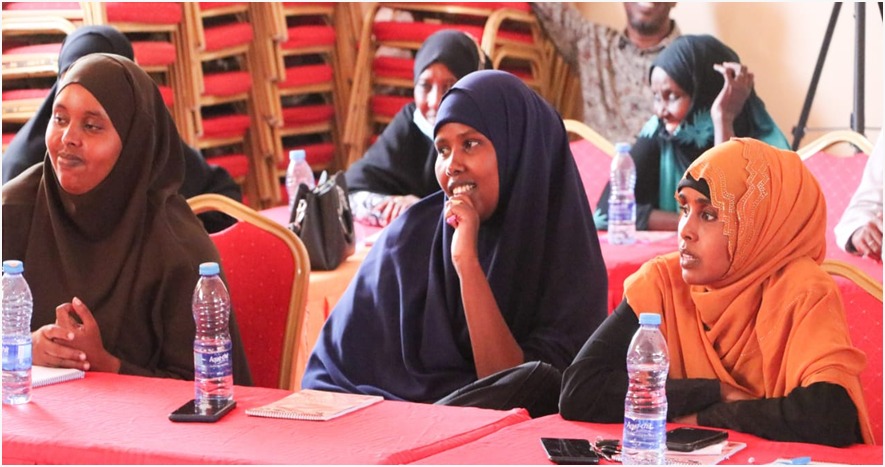
Going Against the Grain: Wajir Women Council of Elders
Historically, women in Wajir and the larger Northeastern region have suffered in silence as community justice systems work against them. Women’s marginalisation is rooted in harmful social cultural norms such as the clan based negotiated democracy seen in this Northeastern part of Kenya.
Political leadership positions have typically been negotiated and decided on by a Council of Elders (CoE) in a bid to reduce politically related conflict between clans. However, since women are not represented in the CoE, their concerns have been silenced, resulting in exclusion from political leadership and decision -making.
The lack of women’s voices has contributed to a prevalence of violence against women and girls (VAWG) and a lack of justice for many survivors. Women in these communities have blamed the elders who sit on the CoE and have the power to arbitrate on sexual and gender-based violence (SGBV) cases, of using the system to pass lenient punishments for perpetrators. Furthermore, cases of rape and defilement, which are listed as criminal matters and should be dealt with through the courts, are often dealt with by elders and the Maslaah alternative dispute resolution systems.
Muktar Liban, the REINVENT Programme Technical Lead for the Northeastern region, says women have long remained invisible in spaces where decisions that affect their lives and safety are made.
“First, we are talking about women not having room to make decisions over their own lives. We are a community that is rooted in clannism, and the [composition of] the Council of Elders reflects the place of women in their society, invisible.”
In response, REINVENT, built upon its predecessor programme Jami Thabiti, held several consultative sessions with women leaders in Wajir County with the aim of resolving their exclusion from decision-making positions and participation in politics.
In early 2020, women leaders from Wajir were supported by REINVENT and Raia Development Initiative (RDI) to go against the grain and form the Wajir Women Council of Elders. The Council now has various chapters across the expansive Wajir County.
“When faced with a problem, people usually pray for divine intervention. When that fails, they beg for a solution but that, too, has failed. Now women are consolidating their numbers and establishing a system that can accommodate and amplify the voices of women and girls,” says Muktar.
Strategic moves
The all-female Council was established when local women leaders recognised that the male CoE was presenting a significant obstacle to the achievement of their objectives and so began to explore the possibility of forming an all-women alternative.
“There are six sub-counties in Wajir Central; Eldas, Tarbaj, Wajir North, Wajir West, Wajir East, and Wajir South. We started by writing memoranda to the Council of Elders in our areas. The Sultans, or leaders of the Council of Elders, granted us an audience. Fortunately, those near urban areas were more open to the idea of women forming a council of their own,” says one member.
Women elders believe the Male elders did not resist the idea because it was neither challenging their role nor were the women bulldozing their way into the male Council of Elders. It was purely to protect the rights of women and girls. Convinced, the Sultans were open and for the first time, even agreed to absorb some women into their existing male Council of Elders.
Inspiring results
One of the significant impacts of the council’s formation was the increased recognition of women’s role in decision-making, leading to the inclusion of women in the traditionally male only Council of Elders. Adan was one of those who coopted.
“I belong to the sub-clan of Degodia Council of Elders. We are two women and six men; we sit with them and consult on many issues. [This is] something that was unheard of before,” says Adan.
So successful was the participation of women that Mohamed Ibrahim, the Executive Director of RDI says that cases of SGBV such as rape and defilement are no longer brought into the Maslaah alternative dispute resolution system, as was the case before, but are instead referred to the formal legal system, which has increased access to justice for survivors of SGBV.
Adan concurs, adding that once the cases started going to police, such as Wajir Central Police Station, community members were able to establish a working relationship with the Gender Unit at the station. The Women Council of Elders is now working closely with police officers to ensure that survivors receive justice.
The creation of the council has triggered the formation of other women’s outfits to champion their rights. So far, there are over 20 women caucuses that have been established across the county. Women use these platforms to articulate their issues and to designs appropriate responses to violence against women and girls.
The Women Council of Elders has been celebrated for not only transforming how VAWG cases are handled, but also for its role in peacebuilding and conflict transformation. One case in point is when the Al-Shabaab militia group bombed and killed eight police officers.
People, including the security forces, were afraid to collect bodies in the event of repeat attacks. Five members of the Women Council, accompanied by a few youths, decided to travel to the site eight kilometers from the Somalia border to retrieve the bodies. “We collected the bodies, and their families were able to give their loved ones a decent send off. Women dared to go where no one else would.”
On the political front, the Women Council has had its share of successes. Its call for women to get into decision making has contributed to women seeking to join politics. In the 2022 elections, a total of 12 women vied to be members of the County Assembly (MCA).
Not a smooth ride
Getting this heart-warming initiative off the ground has not been an entirely smooth ride, encountering its share of challenges, one of which was covering the expansive 50,000 square kilometer area of the county, the size of Western Kenya and Nyanza regions combined.
The size of the county combined with poor transport services and limited resources have made it difficult for Women’s Council members to reach the many ethnic groups and minority clans in the county. One member stated “Apart from the dominant [clans], we have not made inroads into the minority groups and non-locals. This is a huge opportunity that we are missing.”
Women Council of Elders members work as volunteers, and hence need support to reach women and girls and children in the rural areas who are at risk. Despite these challenges, the establishment of the Wajir Women Council of Elders is a major milestone, and its successes so far give its members optimism that they will achieve greater feats.
